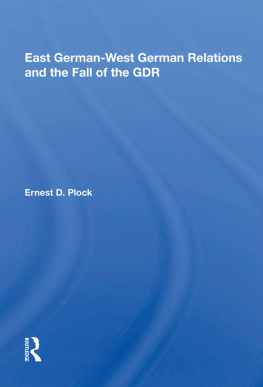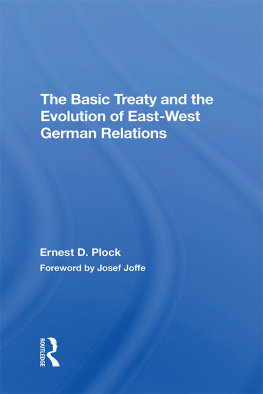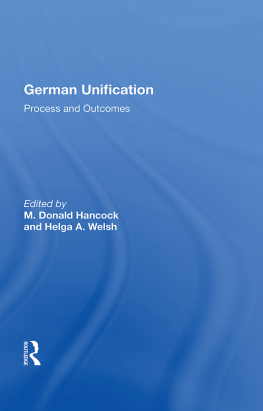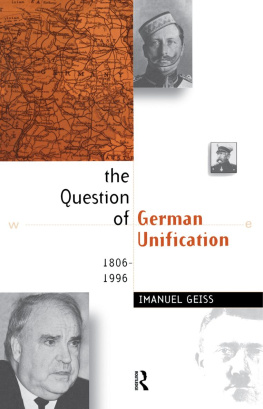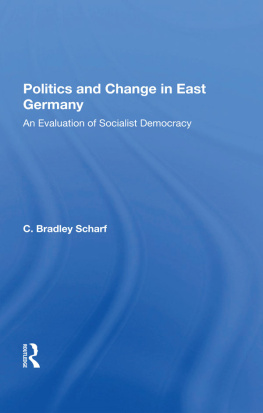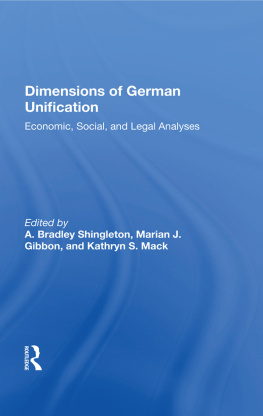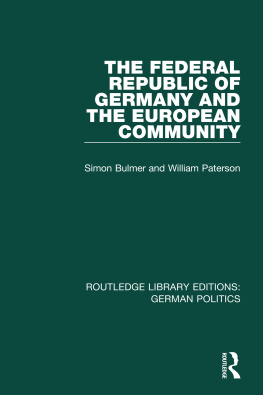East German-West German Relations and the Fall of the GDR
East GermanWest German Relations and the Fall of the GDR
Ernest D. Plock
First published 1993 by Westview Press
Published 2018 by Routledge
52 Vanderbilt Avenue, New York, NY 10017
2 Park Square, Milton Park, Abingdon, Oxon OX14 4RN
Routledge is an imprint of the Taylor & Francis Group, an informa business
Copyright 1993 by Taylor & Francis
All rights reserved. No part of this book may be reprinted or reproduced or utilised in any form or by any electronic, mechanical, or other means, now known or hereafter invented, including photocopying and recording, or in any information storage or retrieval system, without permission in writing from the publishers.
Notice:
Product or corporate names may be trademarks or registered trademarks, and are used only for identification and explanation without intent to infringe.
Library of Congress Cataloging-in-Publication Data
Plock, Ernest D.
East German-West German relations and the fall of the GDR/by
Ernest D. Plock.
p. cm.
Includes bibliographical references and index.
ISBN 0-8133-8145-2
1. Germany (East)Foreign relationsGermany (West) 2. Germany
(West)Foreign relationsGermany (East) 3. GermanyHistory
Unification, 1990. 4. GermanyPolitics and
government19451990. 5. Germany (East)Politics and
government19891990. I. Title.
DD284.5.G3P55 1993
327.431043dc20 92-37784
CIP
ISBN 13: 978-0-367-01610-4 (hbk)
To Mark Robson,
who was right all along
The following study could not have been completed without the tireless scrutiny and imagination of numerous individuals. I wish to give thanks to William C, Cromwell, whose textual suggestions and encouragement in my decision to pursue inner-German relations made all the difference. I am no less indebted to my friend Steven I. Levine for his work on the manuscript and comradeship for its entire duration. Jeffrey Gedmin's assistance was invaluable both in providing useful critiques of the work and in stimulating an exchange of ideas over the sea change in the German landscape.
Others who made generous contributions to the development of this book include Robert Atkins, William Berentsen, F. Gunther Eyck, Margrit Krewson, Ann L. Phillips, and John Siegmund. Last but never least, I would like to express my gratitude to my family and friends for their support while this task was underway: the Robsons, Brooke, Maryrose, Elaine, and Bruce are thereby exempt from future obligations.
Ernest D. Plock
Nationalism and Unity: An Introduction
The collapse of the German Democratic Republic (GDR), as is now clear, was part of a sequence of transformations that eliminated the Communist regimes installed in Eastern and Central Europe after World War II. Several significant developments in 1989 have been identified for their contribution to the overthrow of the Socialist Unity Party (SED) leadership under Erich Honecker and the end of the party's dominant position. Among these are Soviet General Secretary Mikhail Gorbachev's decision not to uphold the SED's monopoly on power with military force, Moscow's increasing preoccupation with internal economic and political problems, and the official inauguration of liberal democracies in Poland and Hungary. Moreover, the Hungarian Government's September decision to remove the remaining barriers to travel to the West acted as an immediate trigger to further depopulation of the GDR as well as to popular demands that led to the eventual removal of SED rule.
Each of these popular revolutions and evolutions in the Soviet security community was unique in its own fight, as each resulted from a particular mixture of social and historical forces and proceeded at its own tempo. No parallel could be found to the Polish case. Poland's transformation into a pluralist, multiparty democracy was accomplished a scant nine years after the thunderous entrance of striking laborers in the Gdansk shipyards. The short-lived success of the Solidarity union in obtaining official status until its violent suppression in 1981 as well as the bold social disobedience of individual Poles made this event unlike earlier upheavals in the Warsaw Treaty Organization (WTO) member states. Indeed, the absence of any emulation of this event elsewhere in the Soviet glacis gave rise to the belief that Solidarity's emergence was a profound aberration, a testimony to the pronounced failure of Polish Communism to penetrate society with its institutions and methods of cooptation rather than a beacon for wider uprisings in Eastern and Central Europe.
Hungary's peaceful, though hardly quiescent, transition to social democracy followed from an even longer period of national reconciliation after the unsuccessful 1956 revolution. The Magyar state's renowned proclivity for experiments with quasi-free market economic tools and milder cultural and political environment suggested a practical alternative for those desperate to discover a "socialism with a human face." Yet the state's declining economic prospects by the 1980s and the catalyzing of a greater appetite for more fundamental reform with the appearance of Mikhail Gorbachev ensured the irrelevance and replacement of a less imaginative Janos Kdr in 1988. And Czechoslovakia's "velvet revolution" capitalized on the actions of a critical mass of human rights activists and liberal socialists estranged by the throttling of the 1968 reforms unveiled by Alexander Dubcek; an "old guard" leadership that distrusted the Soviet reformer's intentions also unwittingly accelerated its own demise.
Certainly the GDR was also "different." It featured neither a population with Poland's insurrectionist elan, a governing elite open to a modest departure from rigid central planning as in Hungary, nor a dissident stratum with the fortitude and influence of "Charter 77" in Czechoslovakia. Lenin's awareness that "Germans don't make revolutions" was somehow intuitively compelling even if it paid insufficient heed to a 1953 uprising in East Germany that necessitated Soviet tanks to vanquish. Moreover, the collapse of this state was as singular as its consequences were heartfelt. With the November 1989 opening of the Berlin Wall and the manifest incapability of the deposed Erich Honecker's party comrades to satisfy a population immovable in its demands for civil rights and political pluralism, the reigning certitudes of post-World War II history were quickly discarded. The piece-by-piece dismantling of what had become the most immutable of Cold War structures was cause for both joy and astonishment. Yet the invalidation of the axiom that East Germany's "forward state" defense status and its barrier to the reappearance of a unified Germany would prevent an internally or externally induced drift out of the Soviet orbit was equally breathtaking. Finally, the October 1990 signatures of the four former wartime allies on documents ending their rights and responsibilities in Germany demonstrated with finality that postwar boundaries in Europe were not frozen in the nuclear age.
The pivotal importance of these outside events for the GDR's October upheaval has been universally appreciated. However, foreign affairs specialists have devoted less attention to the Federal Republic of Germany's (FRG) contribution to the change in East Germany's political landscape, a process more subtle and long-term in its effects but which made its presence felt in a number of ways. West German decisionmakers sought to foster East German identification with the German nation, in particular, through inner-German travel and communication links and economic assistance to the GDR. From Bonn's perspective, the complexity of the German question followed from the recognition that it was necessarily multi-layered. West German governments were not only aiming at fundamental changes in the two German states' relationship and East German internal practices which the GDR elite was reluctant to grant, but the Federal Republic's allies had reason to be apprehensive about too thorough an inner-German rapprochement.


